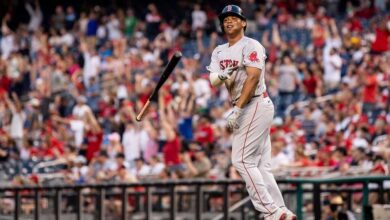Albert Pujols is great, there is no debating that. He’s all-time, hall of fame, ridiculously great, there’s no denying that, either. But nobody, and I mean nobody, is worth the $300 million dollars that Pujols is reportedly asking for in his ongoing contract negotiations with the St. Louis Cardinals. Sure the deal would stretch over ten years, but even David Beckham and Barry Zito think the Cardinals are getting screwed here. Three hundred million dollars? Are you kidding me, Albert? Sorry, still trying to recover after reading that binary code of a contract.
Pujols has often been called “The Machine,” even parodying the nickname in a popular Sportscenter commercial a few years ago, but at $300M, Albert, I really hope you are bionic. Because if you aren’t, Cardinals fans and management will be crying themselves to sleep for the last six years of the proposed ten year deal. I realize that Pujols has been the poster boy for consistency since he entered the league in 2001, but you know what happens to every great athlete? They break down, and they usually break down quickly. While Pujols’ contract proposal is absurd, a similar debate has been played out many times over the last few winters. Most notably, and recently, Derek Jeter and the Yankees had a very public negotiation that brought up the debate: should baseball pay a player based on what he’s done, or on what he still has the potential to do?
Baseball is the only sport that continually awards these type of mega-sized, hyper-inflated contracts to players who are clearly on the downside of their professional peaks, and then about halfway through the contract. Then, both the team and the player are completely stuck. It usually goes something like this: the player is unhappy with his playing time or the direction of the team (a lot of which has to do with the fact that they can’t afford to bring in anyone else after the contract given to said player), resulting in a demanded trade, or a fired manager, or a new hitting coach, or another big bat in the lineup to help out. Then, when one or all of those fail, the team has to try to sucker the Yankees, Red Sox, Cubs, or Angels into taking his contract for practically nothing, because they are the usually only teams who can afford to do so. What happens if those teams pass? A franchise is essentially left for dead, and looking at a long, long road to recovery. Look at the Rangers, for example, who last season were still paying approximately $25 million Alex Rodriguez even though he hasn’t played for them since 2003! Sure they were fortunate enough to make it to the World Series, but imagine what other arms they could have brought in, or another big bat they could have put up against that stellar Giants pitching with that extra funding. Not to mention, look at the decline in production that A-Rod has suffered over the last few years. Not only is he still reaping the benefits of that Rangers contract, but he’s also getting paid more than anyone in baseball this year, and he just posted his lowest BA and HR total ever.
I’m all for rewarding players based on what they’ve meant to your franchise, but there has to be a line drawn somewhere. Baseball is great because it is so different than basketball or football, and has a much longer history. But baseball needs to take a few of the things that are working for those other sports (difficult to see right now as both the NBA and NFL try to avoid impending lockouts) and adapt them into this historical game. Why do so many players get guaranteed contracts and full no-trade clauses? Why are GM’s willing to give a player anything and everything he wants even if that means risking the success of the entire franchise on one player for the next decade? Players get those perks in their deals simply because it has become the standard. If GM’s don’t pander to the players’ demands, they’ll flee to the larger market teams like Boston or New York that make it rain more money than Adam “Pacman” Jones. Mid-market teams overpay to compete, and more often than not, they pay much more than they ever bargained for (I have a feeling the Nationals paying Jayson Werth $126M/7 years this winter may be one of those).
Make no mistake, Albert Pujols deserved to get his money, and he will get copious amounts of it, but at 31 years old and going into his tenth season, a $300M contract is bad for the Cardinals and bad for baseball. Once the bar gets raised that high, where can it go from there? $500M? $750M? Let’s just give the next Albert Pujols a cool billion, just like Bruno Mars has always dreamed of about. I’m being hyperbolic to make a point, but seriously, where does it stop? Before Alex Rodriguez, a contract of this size would have seemed untouchable, even for Major League Baseball which has no salary cap. A $300 M deal would expedite the process of players once again becoming too inflated, and the MLB going through another lockout like it did in 1994, in which case, everyone loses. Especially the fans.
As an Astros fan, there is nothing I’d like to see more than for Albert Pujols to leave my division, but as a baseball fan, there is nothing I’d like to see less. St. Louis deserves to keep him, and they shouldn’t have to break open the bank, the vault, the shoeboxes full of unmarked cash, and sell off every share of stock to do so. So for St. Louis, and everyone else involved, Albert, let’s keep it reasonable. In the end, you’re still going to be very, very rich. And the last thing baseball can afford now is its best player to appear look like all he cares about is money – even if it’s the truth.





